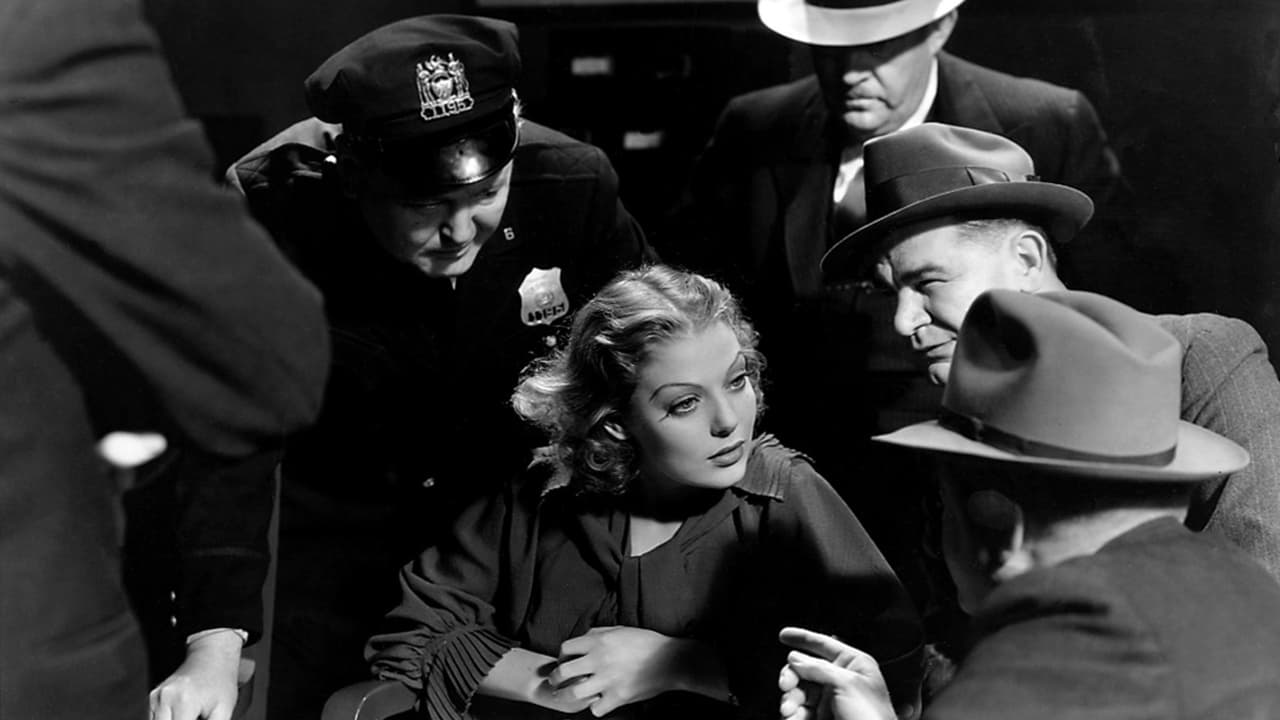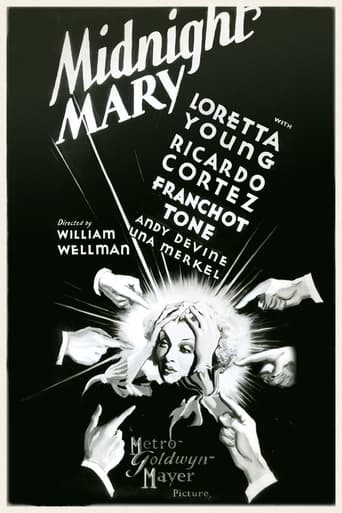

. . . are those who have a Rich Sugar Daddy desperately in love with them, Proletariat Director William Wellman tells us with MIDNIGHT MARY. Though the specific talents which make Loretta Young's version of "Mary Martin" so GIB are left up to the viewers' imaginations, they obviously are so superior to what passed for sex in the 1930s that her Siren Songs cause TWO Rich Guys to risk everything for her. As you might guess, this proves to be at least one Daddy Warbucks too many, with dire consequences for the entire trio. The great irony is that Mary is in jeopardy at all for offing Public Enemy Number One. In the past week, the guys who did the same as Mary for America with a New York prison escapee got hero buttons. Ditto for those who brought down Dillinger, Bonnie & Clyde, Charles Whitman (the Texas Tower Sniper), and the elder Boston Crockpot Bomber. Wellman is warning us here that you have to be an official paid lackey of the Rich to get away with killing people--otherwise, you're up for Murder One (even if you've just gunned down Hitler!).
... View MoreOrdinarily I do not tolerate soap operas well, and "Midnight Mary" is certainly one of these. Commonly referred to as a 'woman's picture', a soap is generally long on talk and unwind at ice-cutter speed. But this picture is different, more of a melodrama with good pacing and acting throughout, and with a thoroughly absorbing screenplay as well.Director/Social Commentator William Wellman hits the mark with an MGM production that has a gritty Warner Bros. flavor to it. It is Loretta Young's picture and she delivers, with help from a surprisingly strong performance from Ricardo Cortez and from the dependable Franchot Tone. Mention should be made of the effective, haunting theme music by Dr. Wm. Axt, who supervised many MGM scores in the '30's.Still very worthwhile although somewhat dated nowadays, its essential social message is intact. Well done all around. I gave it a rating of 8 and felt the film earned every bit of it.
... View MoreThis film is done in an old fashioned style that doesn't play so well for modern audiences who aren't familiar with the style of early 30s "Pre-Code" films. Since I am a huge fan of older films (much more than modern ones), I could forgive all the melodrama and improbabilities that occur in the film--it was the style of the day.The film begins with Loretta Young on trial. Oddly, she refuses to do anything to defend herself and the film soon goes to a flashback of her life. Oddly, director Wellman decided to use Loretta and Una Merkel for some of the early scenes--where they were both supposed to be only 9 years-old! He used large props and changed their dress and hair styles, but they looked a heck of a lot older than 9! In the teenage portion, Loretta was able to pull this off much better since she was still rather youthful when she made this movie.All these early snippets help to show how Loretta gravitated towards a life of crime even though, in some ways, she was a nice girl. When the film moves forward to the late 1920s, the movie slows its pace and instead of brief snippets we follow her as she joins up with a gang headed by tough guy Ricardo Cortez. Here, she is reunited with Merkel--who is quite the floozy--a big departure compared to ladies she played in most other films. Aside from allowing herself to be slapped around, Una also apparently loves premarital sex, as she later gets pregnant. They never say where the kid came from, but I assume it wasn't an immaculate conception! With this and some of the other violence in the film, it's obvious that this Pre-Code film is indeed typical of the racier style of films of the early 30s--something that would be banned starting just a year later with the new and tougher Production Code.Along the way, Loretta meets up with the rich and very nice Franchot Tone. However, Loretta realizes that her checkered past will kill Tone's career as a lawyer, so she quiet disappears--turning herself into the police for her part in a robbery. When she gets out of jail, she deliberately avoids Tone and goes back to the brutal and nasty Cortez--all because she loves Tone too much to mess up his life.Exactly where it goes from there and how it all ends up in court is very entertaining, but I don't want to spoil the surprises. Despite being a tad old fashioned, the Pre-Code morality also makes the film pretty exciting, as most people don't realize how wicked these old films were (they were definitely NOT prudes like we like to think they were). A busy but highly entertaining script, decent performances and excellent direction--this is worth a look.
... View MoreThis is a seldom-discussed but highly significant title in the pre-code canon, as it delineates the compromises a pretty and (originally) moral young woman must make to extricate herself from poverty during the depression. Overall, it's a predictable melodrama, very typical of its period, and the fact that Wild Bill Wellman was for some reason working at MGM for this one tends to stultify the brashness that was his trademark in his early years at Warners. Nonetheless, the tricky editing is very Warners-like and keeps the story moving at a rapid pace, particularly in the jaw-dropping montage where the eponymous character loses her virginity. Most importantly, the script is very frank about sex and absolutely cynical about American society at the time. The most notorious scene is all innuendo -- in order to distract her gangster paramour, Mary inaudibly whispers in his ear, obviously relating in quite some detail the pleasures she will endow him with if only he comes to bed with her immediately. Loretta Young is luminous as always and Ricardo Cortez has a nice time with his role as a confident hoodlum who knows he has her on a string. As for Franchot Tone and Grady Sutton...
... View More